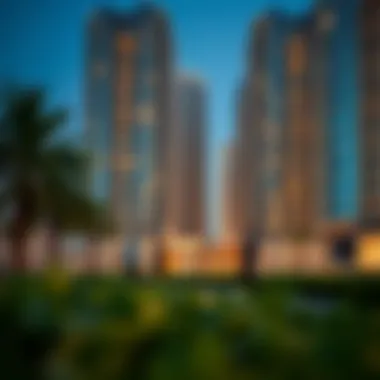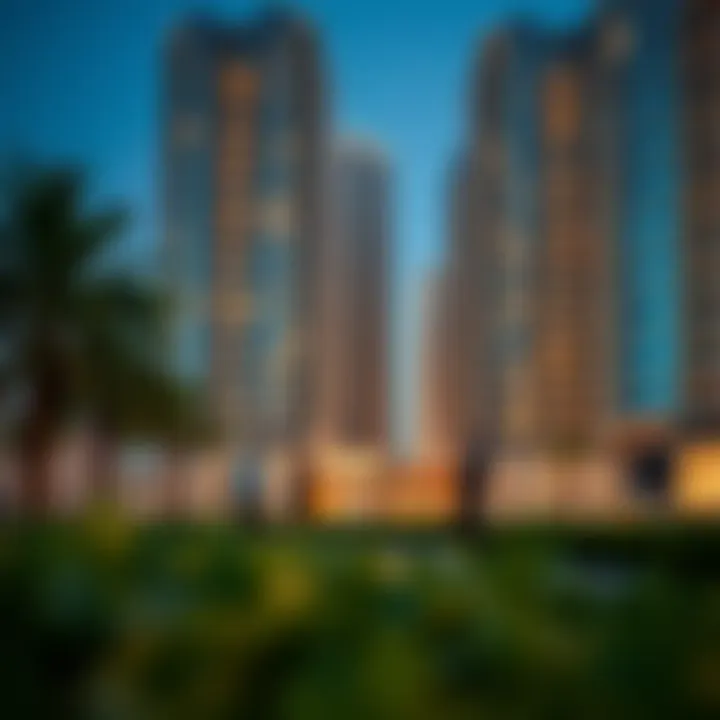Advanced Properties in Dubai's Real Estate Market


Intro
Dubai's real estate market is no stranger to buzz. The skyline dazzles with futuristic designs, while the influx of expatriates, tourists, and investors injects energy into this vibrant market. High-end properties, luxury apartments, and commercial spaces blend seamlessly to form a diverse landscape that appeals to a wide array of buyers. The charm of this city lies not only in its luxurious facade but also in the intricate details that separate the notable properties from the average ones. This article aims to shed light on the advanced properties in Dubai, examining the multifaceted elements that define them. We'll navigate through current market dynamics, investment strategies, and what potential buyers should contemplate.
Market Insights
Understanding the heart of any market is crucial, and Dubai’s real estate scene is no different. The majority of discussions in this sphere turn to the unique trends shaping the buying and selling dynamics.
Current Trends
The emergence of smart homes and sustainable developments is steering the market in a bold new direction. Properties featuring the latest in technology—think automated systems that can control lighting, climate, and security—are gaining traction. Moreover, projects that embrace sustainability, such as those using eco-friendly materials and energy-efficient designs, are rapidly becoming favorites among the eco-conscious crowd.
Interestingly, the luxury segment is also witnessing a shift. Clients are looking primarily for experiences rather than just square footage. Many high-end residential communities are pivoting towards lifestyle offerings, such as private cinemas, wellness centers, and integrated shopping experiences.
Price Analysis
Examining property prices in Dubai provides a clearer picture of its market trends. The prices fluctuate based on location, property type, and amenities. For example, properties in Downtown Dubai or Palm Jumeirah often command premium prices due to their allure and proximity to key attractions. It’s worth noting that as of the last quarter of 2023, property prices in some sectors have risen by approximately 5-10% compared to the previous year. This increase is chiefly driven by the demand for ultra-luxury homes that blend elegance and innovation.
While luxury seems to flourish, the mid-market segment is also struggling to find its footing. Buyers are looking more for value, prompting a transformation in how these properties are marketed. Attractive financing options and flexible payment plans are becoming common fixes to draw in potential buyers.
"Dubai's property market continues to surprise, with innovative developments often setting the standard for global real estate."
In essence, the intricate patterns emerging from price analyses serve as a beacon for investors, guiding them on the road ahead in this evolving landscape.
Investment Strategies
With insights at hand, it’s important to shift gears and consider effective strategies for entering this unique market.
Buying vs. Renting
One predominant question potential buyers face in Dubai is whether to buy or rent. This choice largely hinges on individual circumstances. Buying provides stability and potential capital growth, especially if one is planning to stay long-term. Conversely, renting offers flexibility—an appealing option for expatriates who may wish to change locales.
Key factors to consider include:
- Your length of stay in Dubai
- Current market conditions and projected price trends
- Initial capital available for investment
Financing Options
Navigating financing can appear daunting, but understanding the available options eases the path. Many banks in Dubai offer attractive mortgage products aimed at expatriates, including:
- Fixed-rate mortgages for stability
- Flexible repayment plans that align with income fluctuations
- Assistance for first-time buyers through special programs
An informed choice in financing paves the way for sustainable investment. Engaging with a real estate consultant can also provide personalized guidance tailored to individual financial situations and aspirations.
As we progress through this exploration of Dubai’s real estate market, these insights into market dynamics and investment strategies establish a foundation upon which further understanding can be built.
For more information about property laws and the latest market data, resources such as Dubai Land Department or Real Estate Regulatory Agency offer extensive insights. Keep an eye on platforms like reddit.com/r/dubai for community discussions regarding investment experiences.
Understanding Advanced Properties
Understanding advanced properties is crucial when examining Dubai's real estate market. These properties denote a significant leap beyond the traditional offerings. For potential buyers and investors, grasping this concept allows for informed decisions. It emphasizes the aspects that set advanced properties apart from standard ones, including technology, design, and investment returns.
In a city known for innovation and luxury, advanced properties usually embody the latest in architectural excellence and smart home technology. Recognizing the importance of such properties can yield benefits, such as securing a higher resale value or improving rental income. By honing in on the precise elements of advanced properties, one can better appreciate their role in one of the most dynamic real estate markets in the world.
With Dubai constantly evolving, the dynamics of real estate investments also shift dramatically. Knowing the distinguishing features of advanced properties might save investors from potential pitfalls or missed opportunities. Understanding various considerations—like location, amenities, and technological advancements—will be invaluable for anyone navigating this competitive landscape.
Defining Advanced Properties
When discussing advanced properties, a precise definition is essential. These are not just high-end apartments or luxury villas; they encompass innovative features that blend modern living with cutting-edge technology. The term 'advanced' implies a level of sophistication and forward-thinking design. Think of properties that integrate energy-efficient systems, smart home technologies, and sustainable materials.
Moreover, advanced properties often cater to a lifestyle of convenience and comfort. They are designed to meet the needs of the contemporary inhabitant, prioritizing functionality while also being visually stunning. Properties equipped with smart security systems, automated climate control, and high-speed internet connectivity exemplify what it means to be 'advanced' in the current real estate climate.
Key Features and Attributes
Several key features and attributes distinguish advanced properties within Dubai's market. Here are a few worth noting:
- Smart Home Integration: Most of these properties come outfitted with technology designed to simplify daily life. Think automated lighting and temperature control systems that can be synced with smartphones.
- Sustainable Design: Many advanced buildings use eco-friendly materials and incorporate energy-efficient strategies. Such practices not only reduce carbon footprints but can also lower utility costs for residents.
- Luxurious Amenities: High-end gyms, rooftop pools, and exclusive clubhouses are common in these properties. These amenities enhance the living experience, making them highly desirable.
- Prime Locations: Advanced properties are often situated in sought-after neighborhoods. Areas in Dubai like Downtown and Dubai Marina are known for their vibrant atmosphere and accessibility.
- Aesthetic Value: Beyond practicality, advanced properties often boast stunning designs and customizable features that appeal to a sense of luxury.
"In a rapidly developing city like Dubai, the competition is fierce; thus, understanding these key features is essential for making sound investments."
Ultimately, the combination of these characteristics makes advanced properties attractive investments. Prospective buyers should regard them not just as homes, but as a substantial financial decision that could yield considerable returns in the future.
Market Analysis of Advanced Properties
The market analysis of advanced properties in Dubai holds substantial weight for anyone keen on understanding the current landscape of real estate. It dicsusses trends that directly impact investment decisions and helps to navigate a complex environment. Being informed means investors can strategize better and spot opportunities that others may overlook. This segment will focus on three critical areas: current market trends, a comparative overview, and how demographics influence demand. Together, these aspects build a picture of where the market stands and where it might be headed.
Current Market Trends


Right now, Dubai's real estate market is buzzing like a beehive, with significant shifts in demand and supply. Advanced properties, especially those that are smart and eco-friendly, are not just desirable but are becoming a standard expectation among buyers.
Several trends stand out:
- Sustainability is on everyone's lips, making eco-friendly features like solar panels and energy-efficient appliances essential.
- The integration of smart home technologies appeals to tech-savvy buyers, allowing for enhanced convenience and security.
- Given the bounce back post-pandemic, there's been a fresh influx of expatriates wanting to set roots in Dubai. This has contributed to a brisk uptick in property transactions.
"Investors need to keep one eye on the market and the other on global economic factors. What happens in one part of the world can send ripples through Dubai's property sector."
Comparative Market Overview
Understanding Dubai's advanced property market means looking through a magnifying glass at the comparative aspects versus other global cities. When stacked up against places like London or New York, Dubai shines due to various factors.
- Affordability: While not cheap, properties in Dubai still offer competitive pricing compared to major cities where similar luxuries would cost a fortune.
- Return on Investment: Dubai's rental yields often outperform many Western cities, making it an attractive option for investors.
- Regulatory Environment: The Ease of Doing Business index emphasizes how straightforward it is to buy property in Dubai compared to some other global real estate markets.
From these lenses, it's clear that Dubai provides a unique proposition, especially for those looking at medium to long-term investments.
Demographic Influences on Property Demand
Demographics play a vital role in shaping the property market. The constant influx of expatriates leads to a diverse population base, which fuels demand for varied living arrangements. A few significant trends can be noticed:
- Younger Population: A large portion of the buyers belong to the under-40 age group, leading to increased interest in modern amenities and urban living.
- Family Growth: There is a noticeable shift towards larger family units, which calls for spacious homes in family-friendly neighborhoods.
- Lifestyle Changes: As the way people live evolves, with more focus on health and well-being, advanced properties that offer communal spaces, gyms, and wellness facilities attract a broad swath of buyers.
Keeping these demographic trends in mind can empower investors and developers to tailor their offerings to meet the market's evolving needs.
Investment Considerations
In an increasingly competitive real estate landscape, especially in a vibrant marketplace such as Dubai, understanding the nuances of investment considerations is paramount for both new and seasoned players. This section aims to shed light on the essential aspects that can influence buying decisions and investment strategies. Being astute about profitability, risks, and investment durations can make a world of difference when navigating the advanced property market.
Evaluating Profitability
When assessing a property’s potential for profitability, it involves more than just a cursory glance at current prices and rental yields.
- Cash Flow: The cornerstone of any investment is cash flow. It’s vital to ensure that rental income surpasses expenses, which include maintenance, taxes, and service charges. Investors should also consider the average rental rates in the vicinity to benchmark expected returns.
- Market Appreciation: Understanding the historical trends in property values will provide insight into how much appreciation one can expect. Certain areas in Dubai have shown remarkable growth, while others might stagnate. Tracking these trends through local real estate reports can help in making informed decisions.
- Comparative Analysis: Don't get tunnel vision. Compare similar properties in the vicinity to gauge if an investment is over or undervalued. Tools like property valuation calculators can provide a clearer picture.
Lastly, consider the impact of broader economic conditions on profitability. Economic indicators such as GDP growth rates and employment statistics can significantly affect the real estate market.
Assessing Risks and Rewards
Every investment comes with its fair share of risks, and the advanced property market in Dubai is no exception. Understanding these risks helps in devising strategies for mitigation.
- Market Fluctuations: The real estate market can be temperamental. Prices might dip due to oversupply or economic downturns. Understanding these cyclical patterns will help investors remain resilient during downturns.
- Regulatory Changes: Laws governing property ownership can shift, particularly regarding foreign investments. Staying informed about existing regulations and anticipated changes helps in adjusting investment strategies.
- Vacancy Rates: High vacancies in a community can signal trouble for landlords. Monitoring local trends in vacancy and occupancy can provide critical indicators of a neighborhood's desirability.
Despite these risks, the rewards can be substantial. Properties that align with market demand can yield fantastic returns, especially when situated in up-and-coming neighborhoods. As the saying goes, "fortune favors the bold," so judicious decision-making is essential.
Long-Term vs. Short-Term Investments
Investors often grapple with whether to commit to long-term or short-term arrangements. This choice significantly impacts one’s strategy, goals, and potential returns.
- Long-Term Investments: This typically involves buying property to hold over a period of years. The benefits include appreciation and steady rental income. Long-term investments are advantageous in stable neighborhoods that show consistent growth. Plus, investors can capitalize on lower tax obligations over long holding periods.
- Short-Term Investments: On the flip side, short-term investments often revolve around flipping houses or engaging in short-term rentals. This approach can yield quick profits but comes with higher risks and the need for substantial market acumen.
Ultimately, the decision boils down to individual goals and risk tolerance. Some investors might thrive on the benefits of immediate cash flow through short-term rentals while others might find peace of mind in the long game of property appreciation.
In essence, understanding investment considerations in the advanced property market in Dubai is akin to reading the winds before setting sail; it equips investors to brave the waves effectively and navigate toward success.
For further reading, consider visiting Dubai Land Department for updates on regulations and investment advice.
Legal Framework Surrounding Advanced Properties
Understanding the legal framework that governs advanced properties in Dubai is crucial for anyone looking to dive into this vibrant real estate market. It sets the stage, ensuring not only compliance but also clarity regarding ownership, investment opportunities, and the overall rights of investors and owners. The laws here have an inherent ability to support and protect all parties involved, fostering a sense of security necessary for making significant investments.
Ownership Laws and Regulations
The laws regarding property ownership in Dubai can seem intricate, yet they are designed with an aim to provide clear pathways for both local and international investors. For instance, Dubai is divided into freehold and leasehold areas; the former allowing 100% ownership by expatriates in designated spaces, while the latter provides rights for a limited period. This division is fundamental to understanding where one can purchase property.
In freehold areas, such as Dubai Marina or Palm Jumeirah, foreign investors can acquire full ownership. Conversely, leasehold opportunities, which have durations generally going up to 99 years, are available in places like Jumeirah Lake Towers. Adhering to the laws and regulations in these areas is vital to avoid issues with property acquisition. Potential buyers ought to engage with legal experts familiar with Dubai's property laws to avoid pitfalls associated with ownership rights.
Property Registration Process
The property registration process in Dubai is pivotal in solidifying ownership rights. Once a buyer finalizes a purchase, they must register the property with the Dubai Land Department. Failing to do so may result in legal complications, leaving buyers vulnerable. The registration procedure typically involves several steps:
- Obtain a No Objection Certificate: Prior to registration, sellers must secure this certificate from the relevant developer.
- Submission of Necessary Documents: This includes an Emirates ID, the sales agreement, and the No Objection Certificate.
- Payment of Fees: Buyers must pay registration fees, which generally amount to 4% of the property's value, alongside a nominal administrative fee.
- Issuance of Title Deed: Once the registration is processed, a title deed is issued, providing proof of ownership.
Navigating this process may feel daunting; however, it is essential for ensuring that legal standings are recognized and protected efficiently.
Implications of Foreign Investment
Foreign investments play a significant role in the advancement of Dubai's property market. The UAE has established itself as a favored destination due to its favorable regulations and tax framework. Understanding these implications is critical for foreign buyers. Notably, foreign investors can expect to see quick capital appreciation and rental yields higher than many international markets.


However, investment isn’t without concerns. Issues such as market volatility may impact foreign investors differently, given the fluctuating nature of property prices in Dubai. Moreover, while the laws permit foreign ownership in specific regions, investors must remain informed about regulations that may affect their rights under various circumstances.
These legal frameworks, therefore, not only affect the current investment landscape but are also crucial for long-term strategic planning. Staying updated with legal changes ensures that investors make well-informed decisions that align with both their financial goals and legal obligations.
The Role of Technology in Advancing Properties
In today’s fast-paced world, technology stands as a cornerstone in the evolution of the real estate market, particularly in Dubai's luxury sector. Advanced properties are no longer just about stunning architecture or premium locations; they are increasingly incorporating cutting-edge technological solutions. This integration not only enhances the quality of living but also addresses the demands of a new generation of buyers who prioritize convenience, security, and sustainability.
The impact of technology permeates various aspects of property development, from smart home innovations to the use of data analytics in property management. Each advancement plays a pivotal role in how properties are designed, marketed, and managed. Understanding these technological implications can help investors and buyers make informed decisions that align with future trends and lifestyle expectations.
Smart Home Technologies
Smart home technologies have rapidly become a significant selling point for advanced properties in Dubai. These systems empower homeowners by offering automated solutions for daily tasks, resulting in enhanced comfort and efficiency. Devices such as smart thermostats, automated lighting systems, and advanced security mechanisms allow homeowners to manage their properties remotely through smartphones or voice-activated assistants.
- Security Features: Modern advancements in security tech, including facial recognition cameras and smart locks, provide homeowners with peace of mind.
- Energy Efficiency: Smart systems can monitor energy usage and even recommend adjustments to save costs while benefiting the environment.
- Enhanced Living: Homeowners can customize their environments according to their preferences—controlling everything from temperature to lighting ambiance, thus transforming daily living into a more tailored experience.
For many potential buyers and investors, the adoption of smart technologies is not just an added luxury; it’s expected as standard in high-end properties.
Impact of Virtual Reality and Augmented Reality
The advent of Virtual Reality (VR) and Augmented Reality (AR) has revolutionized how potential buyers interact with the property market. These technologies allow prospective homeowners to take virtual tours of properties before making any commitments. It eliminates the hassle of physically visiting multiple sites, offering an immersive experience that can capture the nuances of space and design.
Moreover, developers can utilize AR when showcasing properties under construction, providing buyers with the ability to visualize their potential home as it will look in the finished state. This capability significantly reduces uncertainty and enhances buyer confidence.
- Cost Efficiency: For agents and developers, it minimizes the resources spent on physical showings and materials, leading to enhanced operational efficiency.
- Targeted Marketing: Immersive experiences tailor the marketing approach to the preferences of a tech-savvy demographic, making properties more appealing to a market that increasingly values experience over mere transactions.
From stunning drone photography that captures the essence of the Dubai skyline to TVAR that integrates furniture in listings, this technology is reshaping the market landscape.
Data Analytics in Property Management
In this digital age, the role of data analytics in managing advanced properties cannot be underestimated. Real estate firms are utilizing data to understand market trends, assess property values, and predict occupancy rates, allowing them to make smarter decisions.
- Market Insights: Big data provides invaluable insights into demographic trends and market dynamics, helping investors identify prime opportunities before they become mainstream.
- Operational Efficiency: Property management software that uses data analytics can streamline operations, from maintenance scheduling to tenant relationships, thereby improving the overall resident experience.
- Investment Strategies: By analyzing past sales trends, rental prices, and tenant turnover rates, investors can develop more effective strategies tailored to maximize profit.
For today’s discerning buyers and investors, having access to real-time data analysis is a game-changer; it brings a level of transparency and confidence to transactions that was previously unavailable.
Technological advancements in the real estate sector promise a future characterized by smarter living, improved sustainability, and more informed decision-making. Understanding and embracing these changes is key to navigating Dubai's dynamic advanced property landscape.
Luxury Living and Advanced Properties
Luxury living and advanced properties have carved a unique niche in Dubai's real estate landscape. With a blend of opulence and innovation, they cater to a discerning clientele that values more than just square footage. Buyers and investors alike recognize that these properties represent a lifestyle that combines convenience, class, and cutting-edge technology.
Design Innovations in Luxury Properties
In recent years, design in luxury properties has transcended traditional boundaries to embrace innovative concepts that redefine living spaces. Architectural marvels dot Dubai's skyline, showcasing unique designs that cater to both aesthetic appeal and functional use.
- Sustainable Architecture: Many advanced properties implement eco-friendly techniques, using materials that reduce environmental impact without compromising on luxury. From solar panels to rainwater harvesting systems, sustainability is at the forefront of design principles.
- Adaptive Spaces: Flexible layouts allow homeowners to modify spaces according to their changing needs. Whether it’s a home office or entertainment area, adaptability is key.
- High-Tech Features: Smart designs integrate home automation systems that control lighting, sound, and security with a simple tap on a smartphone. This tech-savvy approach offers unparalleled convenience.
Design is not just about looks; it’s about enhancing everyday living through thoughtful planning and state-of-the-art technology.
Lifestyle Amenities and Their Value
Amenities play a critical role in enhancing the value proposition of luxury properties. These features not only enrich the living experience but also significantly influence market demand.
- Resort-Like Facilities: Many luxurious developments come equipped with pools, spas, fitness centers, and landscaped gardens. These amenities offer residents a unique oasis within the bustling city.
- Community Spaces: Open areas for socializing and family activities foster a sense of community among residents. Private cinemas, lounges, and even dedicated areas for pets are becoming standard in high-end developments.
- Proximity to Services: Location is crucial. Luxury properties often boast closeness to high-end shopping, gourmet dining, and cultural landmarks, further increasing their market value.
Services and amenities differentiate advanced properties from others, drawing in prospective buyers who seek complete lifestyle solutions rather than just a place to live.
"In Dubai's competitive market, luxury living isn't just about the property itself; it's about the lifestyle that accompanies it."
Neighborhood Considerations for Advanced Properties
When diving into the realm of advanced properties in Dubai, understanding the role of neighborhoods becomes paramount. The location often dictates the value, desirability, and even the lifestyle associated with a property. Buyers and investors must consider not just the physical attributes of the property itself, but also the surrounding environment and the amenities available. The choice of neighborhood can sometimes be the difference between a sound investment and a costly mistake.
Key Neighborhoods in Dubai for Advanced Living
Dubai boasts several neighborhoods that cater specifically to the advanced property market. Each area has its distinctive flavor, attracting different types of residents and investors.
- Dubai Marina - This area is a beacon for luxury living, offering stunning waterfront views and access to high-end amenities. The vibrant lifestyle here, complete with bustling shops and restaurants, makes it a sought-after location for both residents and short-term investors.
- Downtown Dubai - Home to the iconic Burj Khalifa, this neighborhood is a hub of luxury. Properties here are often priced at a premium, but the potential for appreciation is significant. Being in the center of the action, it appeals to both expatriates and affluent locals.
- Palm Jumeirah - Known for its lavish villas and hotels, the Palm is a symbol of opulence in Dubai. Owning a property here not only provides exquisite views but also a unique lifestyle experience.
- Jumeirah Lake Towers (JLT) - For those seeking more affordability while still being close to the luxury vibe, JLT presents a well-rounded option. It offers a mix of residential and commercial spaces and is attractive to investors looking to rent out properties.
"Location, location, location" isn't just a saying; it's a mantra that every smart investor should live by.
Future Development Plans and Their Impacts
Understanding future developments is crucial. The City of Dubai is constantly evolving, with new projects frequently springing up, which can significantly influence property values. Developers are investing heavily in infrastructure improvements and new residential projects, which means certain neighborhoods may appreciate in value faster than others.
- Expo 2020 Legacy - With the recent global event, the surrounding areas are gearing up for transformations. Properties in zones connected to Expo 2020, such as Dubai South, are expected to see an influx of interest due to enhanced accessibility and facilities.
- The Dubai 2040 Urban Master Plan - This ambitious plan aims to reshape several neighborhoods by introducing green spaces, improving transport networks, and increasing cultural and recreational attractions. For investors, this means being ahead of the curve. Aligning investments in areas poised for future growth can yield substantial returns in a few years.


In closing, when considering advanced properties in Dubai, the surrounding neighborhood is just as important as the structure itself. A smart investor knows that keeping an eye on both current and future trends can provide a clearer picture of the potential for growth and lifestyle suitability. By understanding the unique advantages of each neighborhood and the development plans ahead, investors can identify the best opportunities in this dynamic market.
Sustainability and Advanced Properties
Sustainability has become a significant conversation in the realm of real estate, especially regarding advanced properties in Dubai. The global push towards reducing carbon footprints and ensuring responsible resource utilization intertwines with the lavish and innovative nature of Dubai's real estate market. Buyers and investors increasingly look for developments that not only promise sophistication and luxury but are also designed with sustainability in mind. The demand for eco-friendly buildings isn't just a trend; it reflects a shift in values among consumers and the market at large.
As the UAE faces challenges like rising temperatures and water scarcity, the importance of developing eco-friendly properties cannot be overstated. Sustainability in construction promotes energy efficiency, minimizes waste, and reduces negative environmental impacts. This proactive approach not only contributes positively to the planet but also enhances the attractiveness of properties to modern buyers, who prioritize green living.
"Sustainability isn’t just an option; it’s the future of real estate, particularly in progressive markets like Dubai."
Eco-Friendly Building Practices
When it comes to eco-friendly building practices, several techniques are adopted throughout Dubai's advanced property sector. From the very foundation of constructions to the final touches, these practices ensure a minimal environmental impact. One key area of focus is the use of sustainable materials. Builders are increasingly favoring locally sourced and recycled materials that reduce energy costs and environmental impact. For example, using recycled steel instead of new steel reduces emissions significantly.
In addition, energy-efficient technologies such as solar panels and LED lighting have been integrated into new developments. These technologies not only lower energy bills for residents but contribute to overall sustainability by reducing reliance on non-renewable resources. Water conservation is also critical. Advanced properties often come equipped with rainwater harvesting systems and high-efficiency fixtures to minimize water waste.
- Use of energy-efficient HVAC systems reduces energy consumption.
- Incorporation of natural ventilation and daylighting.
- Green roofs and vertical gardens enhance aesthetics and provide insulation.
This commitment to sustainable practices resonates deeply in a market where future buyers are keen to invest in properties that align with their values.
The Role of Green Certifications
The significance of green certifications in the world of advanced properties cannot be minimized. These certifications act as benchmarks, affirming that a property meets specific sustainability standards set by organizations such as the LEED (Leadership in Energy and Environmental Design) and the Estidama system of Abu Dhabi. In Dubai, properties with such certifications often see enhanced market appeal and increased property values. Moreover, many prospective buyers now consider these certifications not just as perks but as essential factors.
- LEED Certification: Properties certified by LEED showcase commitment to energy efficiency and sustainability.
- Estidama: This focuses specifically on sustainable building practices catering to local environmental considerations.
Investors and buyers alike are increasingly taking note; they acknowledge that these certifications are indicators of long-term cost savings. Properties that excel in energy efficiency often lead to lower utility costs, making them financially appealing over time. Ultimately, green certifications enhance not only a property's marketability but also support a broader commitment to a sustainable future.
In summary, embracing sustainability within Dubai's advanced properties not only safeguards the environment but also enriches the experience of living and investing in luxurious, high-end real estate. It's an undeniable fact that the future of property development lies in balancing luxury with ecological responsibility.
Challenges in the Advanced Property Market
Navigating through the advanced property market in Dubai can be akin to walking a tightrope. Investors, buyers, agents, and developers alike must grapple with multifaceted challenges that can impact profitability, ownership security, and overall market stability. Understanding these challenges is crucial, as they provide insights not only into potential risks but also into strategic opportunities that may arise.
Market Volatility and Its Effects
Market volatility isn’t just a buzzword tossed around in financial conversations; it significantly affects the real estate landscape in Dubai. The dynamic nature of the market can be exhilarating, but it also comes with its fair share of ups and downs. Economic fluctuations, international events, or even local changes in policies can lead to unpredictable price swings.
- Key Factors Contributing to Volatility:
- Global Market Influences: Changes in oil prices or shifts in tourism can create ripple effects in property values.
- Supply and Demand Dynamics: An increase in property listings without corresponding demand leads to saturation, negatively impacting prices.
- Regulatory Changes: New laws or taxes can suddenly alter the attractiveness of investment properties.
As a result, buyers may find themselves in a precarious position, unsure whether to invest or wait for more stable conditions. Sellers may be forced to adjust their price expectations downward, leading to profits that are less than anticipated.
In a volatile market, understanding timing is everything — being able to read the winds can make the difference between a success story and a cautionary tale.
Regulatory Hurdles and Compliance Issues
The regulatory landscape plays a vital role in shaping the advanced property market in Dubai. While the city has made significant strides in welcoming foreign investment and streamlining property ownership, the complexities of local regulations remain a challenging puzzle that needs piecing together.
- Major Regulatory Elements:
- Ownership Restrictions: While many areas of Dubai allow foreign ownership, there are specific zones and conditions that can limit potential buyers.
- Zoning Laws: These dictate what can be built where and can often delay projects due to bureaucratic red tape.
- Building Codes: Stricter safety and sustainability regulations require compliance, adding layers of complexity in the property development process.
The need for compliance not only demands that potential investors understand the laws but also that they remain vigilant. Non-compliance can lead to penalities, legal disputes, or even the inability to occupy a property. Investors must invest time and possibly money into navigating these regulations or risk losing out.
"Awareness of the regulatory environment is crucial in avoiding pitfalls that can undermine potential success in the advanced property market."
Thus, staying informed and perhaps even engaging local experts — from legal advisors to real estate agents — can prove invaluable. The road ahead is fraught with challenges, but with preparation and knowledge, navigating the intricacies of Dubai’s advanced property market can be a rewarding venture.
Future Outlook of Advanced Properties in Dubai
The future of advanced properties in Dubai stands at a crucial juncture, shaped by evolving market dynamics and the aspirations of an increasingly sophisticated demographic. Potential investors and stakeholders must pay heed to how these transformations play out—what seems an elaborate space now holds the promise of elevated investment returns, innovative living standards, and an invigorated lifestyle that caters to diverse tastes. As the UAE continues to focus on its diversification strategies, particularly with a keen eye on its Vision 2021 and beyond, the significance of this topic cannot be overstated.
Understanding the future relevance of advanced properties helps buyers carve their niches within a competitive marketplace. It ensures investors not only keep pace but anticipate shifts that could affect their portfolios. In this regard, several elements warrant attention as they suggest where the market might head.
Projected Trends and Their Significance
Identifying projected trends in the advanced properties sector is akin to inferring the direction of a river’s flow. Among the most palpable trends is the growing incorporation of technology into residential spaces. Home automation, smart appliances, and energy-efficient systems are rapidly reshaping what buyers seek. As tech adoption rises, buyers now prioritize not just luxury fittings but features that enhance their convenience and sustainability. Properties that fit these criteria are likely to see stronger demand and higher appreciation rates.
Additionally, the architectural landscape of Dubai is continually evolving. Developers embrace eco-friendly designs that align with global sustainability trends. Buildings integrated with vertical gardens, solar panels, and energy-efficient materials signal a commitment to environmental stewardship. Such innovations attract both investors interested in sustainability and buyers looking to lower their carbon footprints.
The market will also face the challenge of balancing luxury with affordability. As supply chains stabilize post-pandemic, the opportunity for less costly developments grows. If managed well, developers could find a sweet spot between high-end offerings and accessible housing, broadening their client base and ensuring sustained growth for years to come.
Legacy and Its Long-Term Impact on the Market
The legacy of advanced properties in Dubai is intertwined with the city’s progress as a global hub. Its allure has been its ability to attract substantial foreign investment while being anchored by a robust legal framework that offers clarity and security. However, as Dubai solidifies its position on the global stage, the practices established today will significantly shape the years ahead.
For instance, developments such as the Dubai Creek Tower exemplify the ambition of local real estate to not just adapt but lead in terms of design and function. Such iconic projects contribute to the city’s identity while influencing market valuations and perceptions on a broader scale. As each successful project unfolds, it sets a benchmark that prompts other developers to elevate their offerings. This synergy will undeniably lead to a more respected, appealing, and prospering property environment.
In summary, the future outlook for advanced properties in Dubai is painted with ambitious strokes fueled by technology, sustainability, and robust legal frameworks. Investors, buyers, agents, and developers must stay vigilant and adapt to these trends. By understanding not only the landscape as it exists today, but also the influences that will shape it tomorrow, they can secure their interests and navigate the complexities of this fascinating market.
“The best way to predict the future is to create it.”
In the ever-changing real estate realm of Dubai, anticipation and innovation pave the path towards lucrative opportunities.







